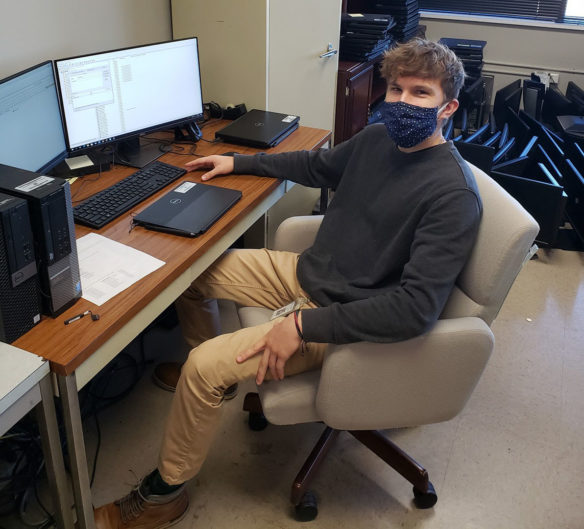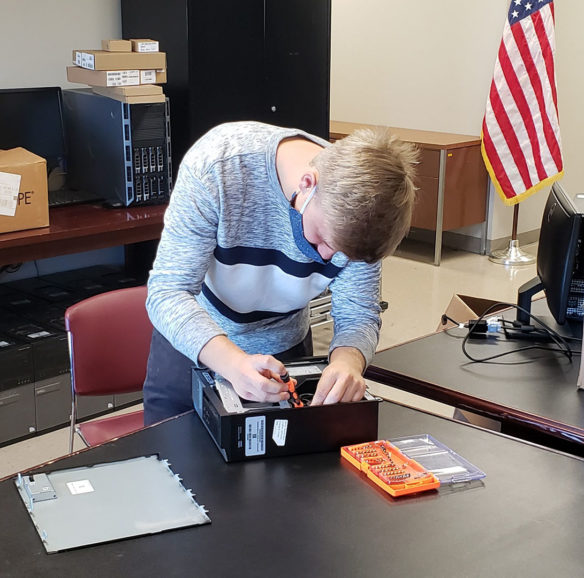The Commonwealth Office of Technology (COT) provides information technology services for state government agencies. A few years ago, COT management decided they needed to look into alternative methods for talent development to combat turnover. That’s when they started exploring registered apprenticeship as an option and a fortuitous meeting with the Kentucky Department of Education (KDE) Office of Career and Technical Education (OCTE) led to an interest in hiring youth apprentices through the Tech Ready Apprentices for Career in Kentucky (TRACK) model.
The TRACK program pairs students in career pathways with employers who offer apprenticeships that relate to those pathways. To be eligible, the students must be concentrating in the program area, having completed a minimum of two courses that connect to the occupation. The student also participates in a paid work-based learning opportunity called a cooperative education placement (co-op).
Two years ago, COT hired three youth apprentices who had been concentrating in information technology at their Frankfort office. They were so pleased with the results, that last year they expanded the program and hired an additional seven youth apprentices to work at their Lexington and Louisville locations, in addition to Frankfort. One 2020 graduate already has completed their apprenticeship and has been hired full-time by COT.
Vova Derkach, a 2020 graduate who attended the Jessamine County Career and Technology Center (CTC), said his participation in the program improved his communication, problem-solving and time management skills. He appreciates that COT has allowed him to work in several departments and learn different specialties.

Vova Derkach
Photo submitted
The program “is a better alternative to college because you don’t need schooling as much as hands-on experience when working with computers,” Derkach said. “It’s a great way to be introduced to adulthood.”
Daniel Sushik, another 2020 graduate who attended the Jessamine County CTC, said his information technology courses were vital in preparing him for this opportunity.
“This program has changed the whole course of my career, and frankly, my life,” said Sushik, who was hired full time by COT. “I was able to get into the field without the need of higher education, and even if I go to college one day, it will be a better experience.”
“The most important lesson that I learned while taking information technology courses at Franklin County CTC was that most computer issues require problem-solving,” said Tyler Stone, a recent graduate. “The apprenticeship is giving me job experience, helping me to build connections in the field and helping me to understand what to expect from a job in information technology.”
Stone is continuing a family tradition of working for state government and said that his grandmother used to work for COT.
“My family is thrilled to see me be a part of this apprenticeship,” he said.
Current Franklin County CTC senior Andrew Wright said he found his love of information technology during his high school courses. He sees this opportunity as a “rare occurrence” and he expected his first job probably would be in fast food.
“I wanted a job that I truly believed in and could see myself working in the future,” Wright said.
Before beginning the program, Wright said, he was one of those students who thought a co-op would hurt more than it helped his grades.
“However, now that I have experienced a co-op firsthand, I can confidently say that every high school student should join one of these programs,” he said.

Daniel Sushik
Photo submitted
Chrissy Gibson, COT’s Northern Field Services branch manager, and Robert Blystone, COT’s Eastern Field Services branch manager, oversee the youth apprenticeship program. When asked what interested COT is this model, they said it helps them identify and cultivate talent.
“We teach the practical skills and identify those with the right soft skills early on before a significant investment in theory takes place,” Blystone said. “All while we are supporting and building up the citizens of the Commonwealth of Kentucky.”
Gibson said they had two initial concerns about working with this age group. The first was how agency customers would receive these students and would their maturity level be a negative factor. The second was about losing their return on investment if they had to spend a large amount of time and resources with mentoring and supervising.
“We are astounded by how well these students have conducted themselves,” Gibson said. “We have found that the apprentices’ attitude and willingness to learn exceeds that of our typical professionals. This allows us to make calculated investments in education that return very high yields. We have fielded questions from other agencies about our experiences with an apprenticeship program in hopes of starting their own programs.”
Blystone said the apprentices have had a strong foundation of knowledge that allowed COT to build their skill sets quickly and make an impact very early on in their apprenticeships.
“Another great return on this investment is that the regular interaction between veteran staff fosters greater engagement from veteran staff and acts as a check for them to ensure they are doing things the right way,” Gibson said. “It helps sharpen their communication skills, being able to explain complex concepts in simple terms. Mentorship provides purpose and demonstrates trust in existing employees. Overall, it helps to improve our existing techs.”
For more information about the TRACK Youth Apprenticeship program, email Mary Taylor from the Kentucky Department of Education (KDE) OCTE.




Leave A Comment